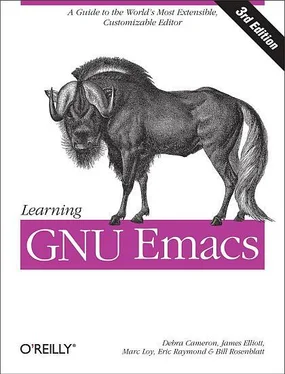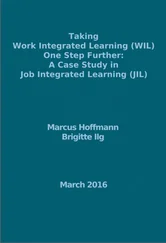(funcall '+ op2 op1)
Thus, the function +is called with the two arguments, which is exactly equivalent to simply (+ op2 op1). Finally, the result of the function is pushed back onto the stack.
All this voodoo is necessary so that, for example, the user can type a plus sign and Lisp automatically converts it into a plus function. We could have done the same thing less elegantly—and less efficiently—by writing calc-operatewith a condconstruct (as in calc-next-token), which would look like this:
(defun calc-operate (tok)
(let ((op1 (calc-pop))
(op2 (calc-pop)))
(cond ((equal tok "+")
(+ op2 op1))
((equal tok "-")
(- op2 op1))
((equal tok "*")
(* op2 op1))
((equal tok "/")
(/ op2 op1))
(t
(% op2 op1)))))
The final thing to notice in the calculator mode code is the function calc-mode, which starts the mode. It creates (and pops to) the *Calc*buffer. Then it kills all existing local variables in the buffer, initializes the stack to nil(empty), and creates the local variable calc-proc-fun(see the earlier discussion). Finally it sets Calculator mode as the major mode, sets the mode name, and activates the local keymap.
11.5.4 Lisp Code for the Calculator Mode
Now you should be able to understand all of the code for the calculator mode. You will notice that there really isn't that much code at all! This is testimony to the power of Lisp and the versatility of built-in Emacs functions. Once you understand how this mode works, you should be ready to start rolling your own. Without any further ado, here is the code:
;; Calculator mode.
;;
;; Supports the operators +, -, *, /, and % (remainder).
;; Commands: ;; c clear the stack
;; = print the value at the top of the stack
;; p print the entire stack contents
;;
(defvar calc-mode-map nil
"Local keymap for calculator mode buffers.")
; set up the calculator mode keymap with
; C-j (linefeed) as "eval" key
(if calc-mode-map
nil
(setq calc-mode-map (make-sparse-keymap))
(define-key calc-mode-map "\C-j" 'calc-eval))
(defconst calc-number-regexp
"-?\\([0-9]+\\.?\\|\\.\\)[0-9]*\\(e[0-9]+\\)?"
"Regular expression for recognizing numbers.")
(defconst calc-operator-regexp "[-+*/%]"
"Regular expression for recognizing operators.")
(defconst calc-command-regexp "[c=ps]"
"Regular expression for recognizing commands.")
(defconst calc-whitespace "[ \t]"
"Regular expression for recognizing whitespace.")
;; stack functions
(defun calc-push (num)
(if (numberp num)
(setq calc-stack (cons num calc-stack))))
(defun calc-top ( )
(if (not calc-stack)
(error "stack empty.")
(car calc-stack)))
(defun calc-pop ( )
(let ((val (calc-top)))
(if val
(setq calc-stack (cdr calc-stack)))
val))
;; functions for user commands:
(defun calc-print-stack ( )
"Print entire contents of stack, from top to bottom."
(if calc-stack
(progn
(insert "\n")
(let ((stk calc-stack))
(while calc-stack
(insert (number-to-string (calc-pop)) " "))
(setq calc-stack stk)))
(error "stack empty.")))
(defun calc-clear-stack ( )
"Clear the stack."
(setq calc-stack nil)
(message "stack cleared."))
(defun calc-command (tok)
"Given a command token, perform the appropriate action."
(cond ((equal tok "c")
(calc-clear-stack))
((equal tok "=")
(insert "\n" (number-to-string (calc-top))))
((equal tok "p")
(calc-print-stack))
(t
(message (concat "invalid command: " tok)))))
(defun calc-operate (tok)
"Given an arithmetic operator (as string), pop two numbers
off the stack, perform operation tok (given as string), push
the result onto the stack."
(let ((op1 (calc-pop))
(op2 (calc-pop)))
(calc-push (funcall (read tok) op2 op1))))
(defun calc-push-number (tok)
"Given a number (as string), push it (as number)
onto the stack."
(calc-push (string-to-number tok)))
(defun calc-invalid-tok (tok)
(error (concat "Invalid token: " tok))
(defun calc-next-token ( )
"Pick up the next token, based on regexp search.
As side effects, advance point one past the token,
and set name of function to use to process the token."
(let (tok)
(cond ((looking-at calc-number-regexp)
(goto-char (match-end 0))
(setq calc-proc-fun 'calc-push-number))
((looking-at calc-operator-regexp)
(forward-char 1)
(setq calc-proc-fun 'calc-operate))
((looking-at calc-command-regexp)
(forward-char 1)
(setq calc-proc-fun 'calc-command))
((looking-at ".")
(forward-char 1)
(setq calc-proc-fun 'calc-invalid-tok)))
;; pick up token and advance past it (and past whitespace)
(setq tok (buffer-substring (match-beginning 0) (point)))
(if (looking-at calc-whitespace)
(goto-char (match-end 0)))
tok))
(defun calc-eval ( )
"Main evaluation function for calculator mode.
Process all tokens on an input line."
(interactive)
(beginning-of-line)
(while (not (eolp))
(let ((tok (calc-next-token)))
(funcall calc-proc-fun tok)))
(insert "\n"))
(defun calc-mode ( )
"Calculator mode, using H-P style postfix notation.
Understands the arithmetic operators +, -, *, / and %,
plus the following commands:
c clear stack
= print top of stack
p print entire stack contents (top to bottom)
Linefeed (C-j) is bound to an evaluation function that
will evaluate everything on the current line. No
whitespace is necessary, except to separate numbers."
(interactive)
(pop-to-buffer "*Calc*" nil)
(kill-all-local-variables)
(make-local-variable 'calc-stack)
(setq calc-stack nil)
Читать дальше












